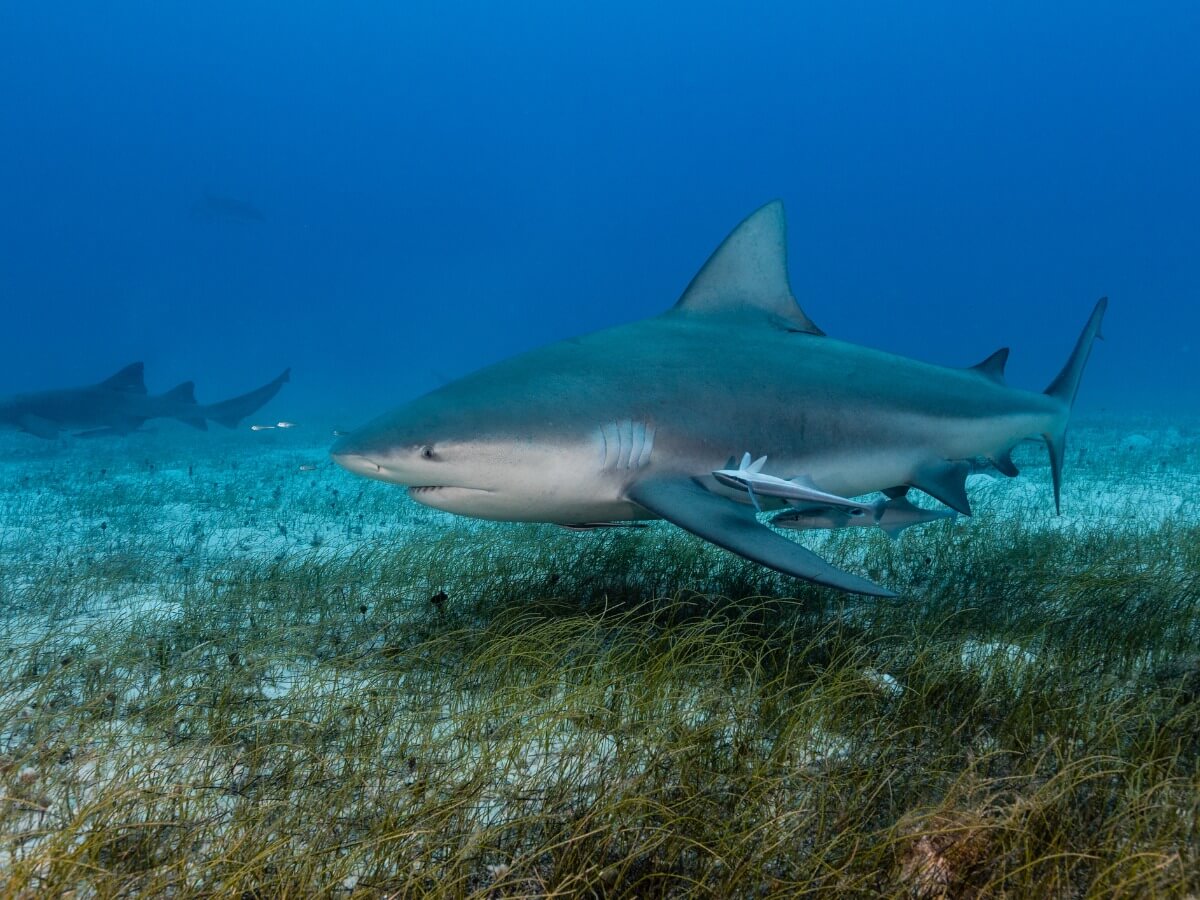Sharks Have Long-Lasting Relationships

Sharks are a species whose image has been most distorted by human representations. Movies, stories and even some documentaries reflect them as ruthless, cruel and lonely predators.
Fortunately, its nightmare image is gradually being dismantled with each study and awareness campaign. In fact, recently a study has been published that shows that no rule is absolute. Why? Because it seems that the shark is also capable of maintaining lasting relationships.
Study characteristics
The study that concerns us in this article – Companions and Casual Acquaintances: The Nature of Associations Among Bull Sharks at a Shark Feeding Site in Fiji – took as an object of study the lamia sharks (Carcharhinus leucas). These sharks populate the waters around the island and, despite their threatening appearance, they’re very peaceful and can swim around humans without putting them in danger.
The average length of these fish, which years ago could reach 3 meters (6.6 feet), has been reduced to 2.3 meters due to the intensive hunting of the largest specimens.
The cited publication is a longitudinal study that has recorded the movements of 91 lick shark specimens over 13 years. The identification of individuals was carried out through scars, deformations or missing limbs. 3,000 dives were made in Fiji’s Shark Reef Marine Reserve (SRMR) to study its behavior.

Results: sharks have long-lasting relationships
Although affiliative behavior among sharks had already been observed before, it was carried out under unreliable conditions. This was because it was an aquaculture operation, in which these fish can’t behave naturally. Furthermore, both the duration of the study and the number of individuals were too few.
However, the results of previous investigations have been confirmed by the study in question. In it, divers sampled the number of times the same sharks appeared in various dives, and which sharks appeared with each other.
Not only did this reinforce the idea that certain sharks preferred the company of certain sharks, but it also showed that they sustained these affiliations over time. Despite being solitary animals, the presence of available and sufficient food for all provided by diving tourism in Fiji means that sharks join together to feed without competing.
The direct feeding of the sharks seemed to favor fission-fusion dynamics among the specimens that came every day to the dive site.
Discussion
The downside that the study authors themselves showed is exactly what we mentioned. The lamia sharks don’t need to compete with each other to feed, as the visitors provide it. We don’t know whether they would do the same if the resources were more limited resources.
In fact, the number of sharks that approach the reserve to feed is gradually increasing. These groups, with a reduced risk of predation and competition, are also beneficial for them to find a mate in the reproductive season.
Conclusions: friendship between sharks
The researchers added one more nuance to the conclusions they had found: talking about friendship between sharks is an anthropocentric idea. By this they meant that applying biological processes such as gregariousness to solitary animals in a deterministic way is, at best, reckless.
In observational studies, it’s easy to try to identify with species, even if they’re as biologically distant as sharks. This process, even though it fosters empathy between species and helps to progressively identify the universal bases of behavior, must follow a scientific process in order to verify it.

What’s clear is that these discoveries are a sign that nothing is absolute and that the nature of a species doesn’t completely determine its behavior. Even using an anthropomorphic point of view, this study is further proof that there’s no need for war when there are enough resources for everyone.
Sharks are a species whose image has been most distorted by human representations. Movies, stories and even some documentaries reflect them as ruthless, cruel and lonely predators.
Fortunately, its nightmare image is gradually being dismantled with each study and awareness campaign. In fact, recently a study has been published that shows that no rule is absolute. Why? Because it seems that the shark is also capable of maintaining lasting relationships.
Study characteristics
The study that concerns us in this article – Companions and Casual Acquaintances: The Nature of Associations Among Bull Sharks at a Shark Feeding Site in Fiji – took as an object of study the lamia sharks (Carcharhinus leucas). These sharks populate the waters around the island and, despite their threatening appearance, they’re very peaceful and can swim around humans without putting them in danger.
The average length of these fish, which years ago could reach 3 meters (6.6 feet), has been reduced to 2.3 meters due to the intensive hunting of the largest specimens.
The cited publication is a longitudinal study that has recorded the movements of 91 lick shark specimens over 13 years. The identification of individuals was carried out through scars, deformations or missing limbs. 3,000 dives were made in Fiji’s Shark Reef Marine Reserve (SRMR) to study its behavior.

Results: sharks have long-lasting relationships
Although affiliative behavior among sharks had already been observed before, it was carried out under unreliable conditions. This was because it was an aquaculture operation, in which these fish can’t behave naturally. Furthermore, both the duration of the study and the number of individuals were too few.
However, the results of previous investigations have been confirmed by the study in question. In it, divers sampled the number of times the same sharks appeared in various dives, and which sharks appeared with each other.
Not only did this reinforce the idea that certain sharks preferred the company of certain sharks, but it also showed that they sustained these affiliations over time. Despite being solitary animals, the presence of available and sufficient food for all provided by diving tourism in Fiji means that sharks join together to feed without competing.
The direct feeding of the sharks seemed to favor fission-fusion dynamics among the specimens that came every day to the dive site.
Discussion
The downside that the study authors themselves showed is exactly what we mentioned. The lamia sharks don’t need to compete with each other to feed, as the visitors provide it. We don’t know whether they would do the same if the resources were more limited resources.
In fact, the number of sharks that approach the reserve to feed is gradually increasing. These groups, with a reduced risk of predation and competition, are also beneficial for them to find a mate in the reproductive season.
Conclusions: friendship between sharks
The researchers added one more nuance to the conclusions they had found: talking about friendship between sharks is an anthropocentric idea. By this they meant that applying biological processes such as gregariousness to solitary animals in a deterministic way is, at best, reckless.
In observational studies, it’s easy to try to identify with species, even if they’re as biologically distant as sharks. This process, even though it fosters empathy between species and helps to progressively identify the universal bases of behavior, must follow a scientific process in order to verify it.

What’s clear is that these discoveries are a sign that nothing is absolute and that the nature of a species doesn’t completely determine its behavior. Even using an anthropomorphic point of view, this study is further proof that there’s no need for war when there are enough resources for everyone.
All cited sources were thoroughly reviewed by our team to ensure their quality, reliability, currency, and validity. The bibliography of this article was considered reliable and of academic or scientific accuracy.
- Bouveroux, T. (2021). Companions and Casual Acquaintances: The Nature of Associations Among Bull Sharks at a Shark Feeding Site in Fiji. Frontiers. https://www.frontiersin.org/articles/10.3389/fmars.2021.678074/full
- Loiseau, N., Kiszka, J. J., Bouveroux, T., Heithaus, M. R., Soria, M., and Chabanet, P. (2016). Using an unbaited stationary video system to investigate the behaviour and interactions of bull sharks Carcharhinus leucas under an aquaculture farm. Afr. J. Mar. Sci. 38, 73–79. doi: 10.2989/1814232x.2016.1156578
This text is provided for informational purposes only and does not replace consultation with a professional. If in doubt, consult your specialist.








